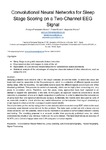Convolutional Neural Networks for Sleep Stage Scoring on a Two-Channel EEG Signal

Use este enlace para citar
http://hdl.handle.net/2183/27654Coleccións
- GI-RNASA - Artigos [195]
- INIBIC-RNASA-IMEDIR - Artigos [46]
Metadatos
Mostrar o rexistro completo do ítemTítulo
Convolutional Neural Networks for Sleep Stage Scoring on a Two-Channel EEG SignalData
2019-06-26Cita bibliográfica
Fernandez-Blanco E, Rivero D, Pazos A. Convolutional neural networks for sleep stage scoring on a two-channel EEG signal. Soft Comput.2020; 24:4067-4079
Resumo
[Abstract]
Sleeping problems have become one of the major diseases all over the world. To tackle this issue, the basic tool used by specialists is the Polysomnogram, which is a collection of different signals recorded during sleep. After its recording, the specialists have to score the different signals according to one of the standard guidelines. This process is carried out manually, which can be highly time consuming and very prone to annotation errors. Therefore, over the years, many approaches have been explored in an attempt to support the specialists in this task. In this paper, an approach based on convolutional neural networks is presented, where an in-depth comparison is performed in order to determine the convenience of using more than one signal simultaneously as input. Additionally, the models were also used as parts of an ensemble model to check whether any useful information can be extracted from signal processing a single signal at a time which the dual-signal model cannot identify. Tests have been performed by using a well-known dataset called expanded sleep-EDF, which is the most commonly used dataset as benchmark for this problem. The tests were carried out with a leave-one-out cross-validation over the patients, which ensures that there is no possible contamination between training and testing. The resulting proposal is a network smaller than previously published ones, but which overcomes the results of any previous models on the same dataset. The best result shows an accuracy of 92.67% and a Cohen’s Kappa value over 0.84 compared to human experts.
Palabras chave
Convolutional neural networks
Deep learning
Electroencephalography
Polysomnography
Signal processing
Deep learning
Electroencephalography
Polysomnography
Signal processing
Descrición
This is a pre-print of an article published in Soft Computing. The final authenticated version is available online at: https://doi.org/10.1007/s00500-019-04174-1
Versión do editor
ISSN
1432-7643





